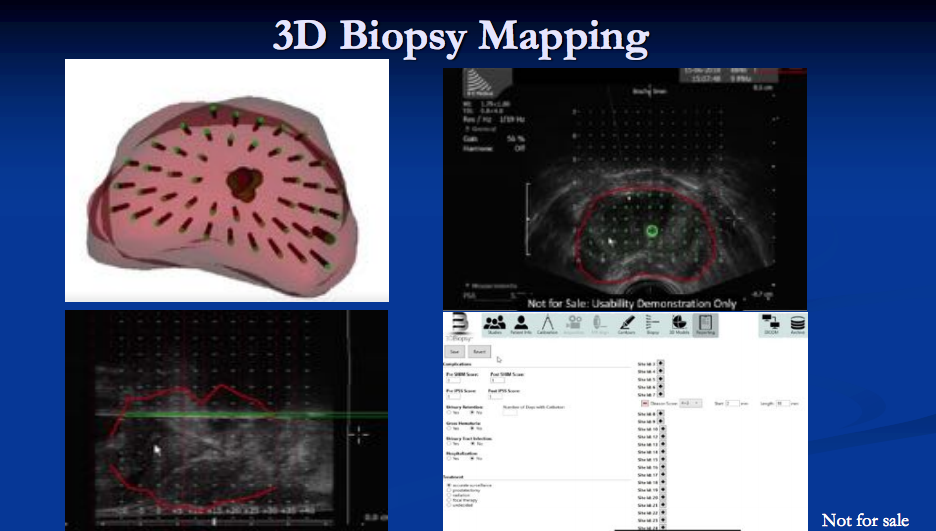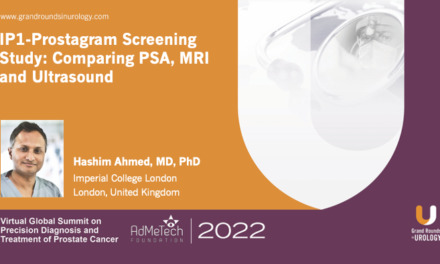Nelson N. Stone, MD, presented “3DBiopsy™: Transperineal Mapping Biopsy in 2019” during the 29th Annual International Prostate Cancer Update on January 26, 2019 in Beaver Creek, Colorado.
How to cite: Stone, Nelson N. “3DBiopsy™: Transperineal Mapping Biopsy in 2019” January 26, 2019. Accessed Jan 2026. https://grandroundsinurology.com/3dbiopsy-transperineal-mapping-biopsy-in-2019/
3DBiopsy™: Transperineal Mapping Biopsy in 2019 – Summary:#
Nelson N. Stone, MD, discusses the need for adequate and accurate prostate cancer identification techniques, especially when selecting patients for active surveillance. He then reviews an emerging transperineal prostate mapping biopsy system that could be an improved tool for fusion biopsy, replace current transrectal biopsy devices, and better detect and localize lesions.
Abstract:#
According to data on the upgrading of prostate tumors at the time of radical prostatectomy, the rate of upgrading in patients with negative confirmatory tests is 54%. Physicians must recognize this when using tests such as transrectal ultrasound biopsy, MRI, and molecular classifiers to select patients for active surveillance. Furthermore, active surveillance survival outcomes data shows that patients categorized as Gleason score 7 had a 3.1 times higher prostate cancer death rate than Gleason score 6 patients. In other words, determining treatment decisions based on inaccurate detection of Gleason scores could compromise a patient’s survival. Therefore, it is essential to have extremely accurate methods for identifying prostate cancer.
Transperineal prostate mapping biopsy (TPMB) could be the solution to this unmet need. However, there is no standardization to this technique. There is no consensus regarding the amount of cores taken, core spacing, whether or not to take in-line cores, nor whether or not to increase the number of cores in cases of larger prostate volume.
This presentation previews the 3DBiopsy(TM) TPMB system with a targeted launch date in 2020. This technology could significantly assist in creating a more standardized process. It also could reduce the number of biopsies taken from patients and possibly provide enough information to guide focal ablation.
About the International Prostate Cancer Update#
The International Prostate Cancer Update (IPCU) is an annual, multi-day CME conference focused on prostate cancer treatment updates. The conference’s faculty consists of international experts, and the event caters to urologists, medical oncologists, radiation oncologists, and other healthcare professionals. Topics encompass prostate cancer management, from diagnosis to treating advanced and metastatic disease. Dr. Stone presented this lecture during the 29th IPCU in 2019. Please visit this page in order to learn more about future IPCU meetings.
ABOUT THE AUTHOR
Nelson N. Stone, MD, is Professor of Urology, Radiation Oncology, and Oncological Sciences at the Icahn School of Medicine at Mount Sinai and chief medical officer at Viomerse, Inc.
Dr. Stone earned his medical degree from the University of Maryland in 1979. He completed a Residency in General Surgery in 1981 at the University of Maryland, followed by a Residency in Urology at the University of Maryland. He then completed a Fellowship in Urologic Oncology at Memorial Sloan-Kettering Cancer Center and a Research Fellowship in Biochemical Endocrinology at Rockefeller University in 1986. He was Chief of Urology at Elmhurst Hospital Queens from 1986-1996.
Dr. Stone has founded several medical companies and serves on the editorial board of many scientific journals. He is a member of many professional societies, including the Prostate Conditions Education Council, the Society for Minimally Invasive Therapy, the New York State Urological Society, the American Association of Clinical Urologists, and the American Urologic Association. Dr. Stone has participated in approximately 25 research studies on prostate cancer and has authored more than 500 articles, abstracts, and book chapters, primarily on prostate cancer. He invented the real-time technique for prostate brachytherapy in 1990 and has trained more than 5,000 physicians worldwide through his company ProSeed. His most recent company, Viomerse, creates synthetic body parts (phantoms) for surgical training and has recently released an extended reality remote training platform.





